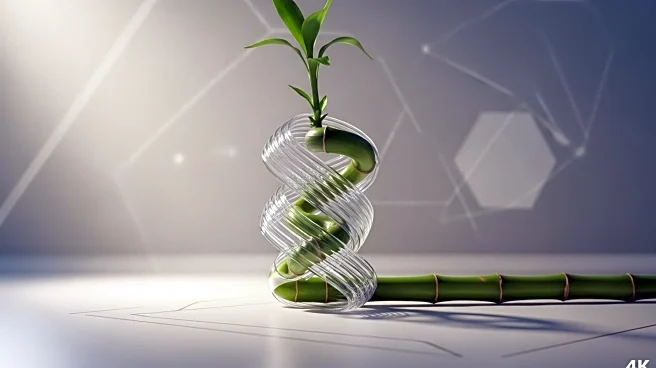What's Happening?
Researchers at Shenyang University of Chemical Technology in China have developed a new type of biodegradable plastic derived from bamboo cellulose. This innovative material is as strong and durable as conventional engineering plastics used in vehicles and household appliances. The process involves treating bamboo with zinc chloride and a simple acid to break down its chemical bonds, followed by the addition of ethanol to form a solidified plastic. This bamboo-based plastic is not only recyclable, retaining 90% of its original strength after recycling, but also biodegradable within 50 days. Despite its rigidity limiting its use in packaging, it presents a viable alternative for specific engineering applications.
Why It's Important?
The development of bamboo-based biodegradable plastic is significant as it addresses the growing demand for sustainable materials in industries traditionally reliant on oil-based plastics. With bioplastics currently representing only a small fraction of global plastic production, innovations like this could help reduce dependency on fossil fuels and mitigate environmental impact. The ability to recycle this material while maintaining its strength enhances its economic viability, potentially encouraging broader adoption in sectors such as automotive and construction. This advancement aligns with global efforts to promote renewable resources and reduce plastic waste.
What's Next?
Further research and development could expand the applications of bamboo-based plastics, potentially leading to wider industrial adoption. As the material becomes more economically competitive, it may attract interest from manufacturers seeking sustainable alternatives. Regulatory support and incentives for bioplastics could also play a role in accelerating its integration into mainstream production. Monitoring the environmental impact and lifecycle of this material will be crucial to ensure it meets sustainability goals.
Beyond the Headlines
The use of bamboo, a fast-growing and renewable resource, highlights the potential for integrating traditional materials into modern manufacturing processes. This development may inspire further exploration of other natural resources for bioplastic production, contributing to a more circular economy. Additionally, the cultural and economic implications for regions where bamboo is abundant could be significant, potentially boosting local economies and promoting sustainable agricultural practices.










